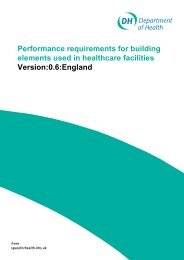Early Life Nutrition and Lifelong Health - Derbyshire Local Medical ...
Early Life Nutrition and Lifelong Health - Derbyshire Local Medical ...
Early Life Nutrition and Lifelong Health - Derbyshire Local Medical ...
Create successful ePaper yourself
Turn your PDF publications into a flip-book with our unique Google optimized e-Paper software.
BMA Board of Sciencemay be effective in improving breastfeeding initiation rates in women from disadvantagedbackgrounds. 261 One community-based controlled trial, considered in the review, was carried outover a two-year period in two socially deprived communities in Glasgow, Scotl<strong>and</strong>. One of thecommunities received peer counselling from trained lay breastfeeding counsellors who wereresident within the community. A second trial set in Chicago, USA evaluated the effectiveness of ahospital-based breastfeeding peer counsellor programme delivered to women who expressed aninterest in breastfeeding. Both studies demonstrated improved initiation rates in women who hadexpressed an interest in breastfeeding, suggesting that peer-counselling programmes can beeffective at encouraging women who would like to breastfeed to follow through with their decision.There is also good evidence that appropriate support for breastfeeding mothers can prolong theduration of breastfeeding. A Cochrane systematic review updated in November 2006, based on34 trials of 29,385 mother-infant pairs, showed that all forms of extra support together wereassociated with an increase in duration of ‘any’ (includes partial <strong>and</strong> exclusive) breastfeeding – therelative likelihood of stopping breastfeeding before six months was 0.91 (95% CI 0.86 to 0.96). 269Additional professional support (over <strong>and</strong> above st<strong>and</strong>ard care) was effective in prolonging ‘any’breastfeeding but its effect on exclusive breastfeeding was unclear. Additional support from trainedlay people was effective in prolonging exclusive breastfeeding while its effect on duration of anybreastfeeding was unclear. Exclusive breastfeeding was significantly prolonged with use ofWHO/United Nations Children’s Fund (UNICEF) Baby Friendly Hospital Initiative training forprofessionals. Overall, the relative likelihood of stopping exclusive breastfeeding during the studyperiod considered was 0.69 (95% CI 0.52 to 0.91) in the six RCTs using the WHO/UNICEF training.Key messageInterventions that educate women about the benefits <strong>and</strong> practice of breastfeeding areeffective at increasing breastfeeding initiation. Appropriate support for breastfeeding motherscan prolong the duration of breastfeeding.The WHO/UNICEF Baby Friendly Hospital InitiativeThe Baby Friendly Hospital Initiative is a worldwide programme of the WHO <strong>and</strong> UNICEF. It waslaunched in 1992 to encourage maternity hospitals to implement the Ten steps to successfulbreastfeeding (see Box 12) <strong>and</strong> to practise in accordance with the International Code of Marketingof Breast Milk Substitutes (Appendix 5).Hospitals are encouraged to introduce a breastfeeding policy, educate staff to implement the policyaccording to role <strong>and</strong> introduce practices which promote, protect <strong>and</strong> support breastfeeding.External assessment can then lead to accreditation for those facilities implementing the st<strong>and</strong>ardseffectively. In the UK, the Initiative has been exp<strong>and</strong>ed to include community healthcare facilities.Accreditation of universities which introduce approved education for breastfeeding into their preregistrationcourses for midwives <strong>and</strong> health visitors has also been introduced.<strong>Early</strong> life nutrition <strong>and</strong> lifelong health 57



